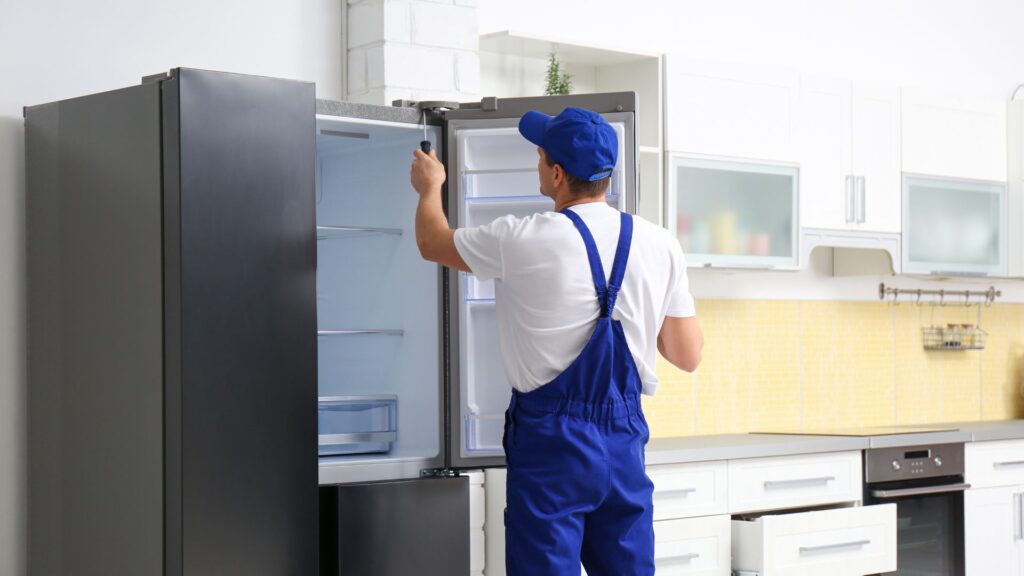Getting rid of an old refrigerator or freezer can feel like a daunting task. These bulky appliances, often no longer in use, tend to occupy valuable space in garages, basements, or backyards. Yet, simply dumping them at the curb or leaving them to rust is neither environmentally responsible nor legally advisable. Disposing of these large appliances efficiently requires a thoughtful approach, blending convenience, sustainability, and compliance with local regulations. Taking the right steps can save time, reduce hassle, and even provide unexpected benefits, such as recycling valuable components or ensuring the safe handling of hazardous materials.
First, it’s important to understand why old refrigerators and freezers can’t be treated like regular trash. These appliances contain refrigerants and oils that can be harmful if released into the environment. Additionally, their sheer size makes them impractical for standard waste collection services. Knowing this, many people look for specialized removal services or programs designed to handle appliance disposal responsibly. This not only protects the environment but can also help avoid hefty fines associated with improper dumping.
Understanding the Environmental Impact of Disposing Refrigerators and Freezers
Discarding refrigerators and freezers improperly carries significant environmental consequences. These appliances contain refrigerants such as chlorofluorocarbons (CFCs) or hydrochlorofluorocarbons (HCFCs), substances that contribute to ozone layer depletion and global warming. When these chemicals leak into the atmosphere, they can linger for decades, causing irreversible damage. Moreover, older models often include insulating foam and other materials that, if not handled correctly, release toxic gases. Simply tossing a refrigerator or freezer into a landfill without extracting these substances can exacerbate environmental harm.
Beyond refrigerants, these appliances are composed of metal, plastic, and glass, all of which are recyclable if processed properly. Recycling not only conserves natural resources but also reduces the energy consumption required to manufacture new products. Thus, efficient disposal involves more than just removing an eyesore; it is an essential step toward environmental stewardship. Individuals who commit to eco-friendly disposal methods help minimize pollution and promote sustainable waste management practices, ensuring their discarded appliances don’t become a burden on the planet.
Exploring Local Regulations and Disposal Options
Before proceeding with disposal, it is crucial to familiarize yourself with local laws governing appliance removal. Regulations vary widely by location and often dictate how and where refrigerators and freezers can be discarded. Many cities or counties have special collection days, drop-off centers, or partnerships with recycling companies that facilitate safe disposal. Ignoring these rules can result in fines or penalties, so a little research saves both money and headaches.
Some municipalities require proof that refrigerants have been safely removed by certified technicians before accepting appliances for disposal. Others may offer incentives or rebates for turning in old units for proper recycling. For residents, this means contacting local waste management offices or visiting government websites to understand available programs. In some cases, partnering with professional junk removal services can simplify compliance, as these companies stay up to date on laws and offer seamless pick-up and disposal tailored to regional requirements.
Preparing Your Refrigerator or Freezer for Removal
Before scheduling a pick-up or drop-off, certain preparation steps ensure the removal process is smooth and efficient. Unplugging the appliance well in advance allows any residual refrigerants to stabilize and prevents electrical hazards. Emptying the contents and thoroughly cleaning the interior not only avoids unpleasant odors but also helps technicians handle the unit safely. Leaving the doors slightly ajar after cleaning prevents mold growth while the appliance waits for removal.
Removing any detachable parts such as shelves or drawers can also facilitate handling and transportation. Labeling these components prevents confusion if you intend to reuse or recycle them separately. Additionally, taking note of the appliance’s make and model can assist recycling centers in processing the unit correctly. By investing a little time in preparation, you reduce potential delays and contribute to a faster, hassle-free disposal experience.

Utilizing Professional Appliance Removal Services
Hiring professional junk removal companies specializing in appliance disposal offers unmatched convenience. These services provide not only labor for heavy lifting but also ensure that refrigerators and freezers are dismantled and recycled according to environmental standards. Many companies have the expertise to extract refrigerants safely and transport the unit to certified recycling centers, relieving homeowners from navigating complicated disposal processes.
Moreover, professionals often come equipped with the necessary tools and vehicles, making them capable of handling even difficult-to-access appliances without damage to property. This reduces risk for the homeowner and ensures compliance with disposal regulations. For busy individuals or those lacking the means to transport bulky items, engaging a removal service is a practical and responsible choice that guarantees efficiency and peace of mind.
Donating or Selling Functional Units
Not all old refrigerators or freezers need to be discarded outright. If the appliance is still operational or can be repaired cost-effectively, donating or selling becomes a viable alternative. Many charitable organizations and thrift stores accept functioning appliances, helping families in need while diverting waste from landfills. Selling through online marketplaces also offers a way to recoup some value and extend the lifespan of the unit.
Before donating or selling, it’s important to ensure the appliance meets safety standards and cleanliness criteria. This protects recipients and maintains the appliance’s usability. While donation or resale requires additional effort compared to disposal, the social and environmental benefits often outweigh the inconvenience. Choosing this route not only benefits others but also contributes to a circular economy, emphasizing reuse over waste.
Scrapping Refrigerators and Freezers for Parts
For units beyond repair, scrapping them for parts is another way to maximize value while minimizing waste. Components like compressors, coils, and metal panels can often be salvaged and sold to recycling or refurbishment businesses. This approach requires identifying reputable scrap dealers who follow environmental protocols and pay fair prices for recyclable materials.
Extracting usable parts helps conserve resources and reduce demand for new manufacturing. It also provides a financial incentive for individuals disposing of old appliances. However, scrapping demands a level of mechanical knowledge and safety precautions due to the presence of refrigerants and electrical components. For those equipped with the skills, it’s a productive way to dispose of old refrigerators and freezers responsibly.
Environmental Benefits of Responsible Disposal
Embracing responsible refrigerator and freezer disposal supports broader environmental goals. Proper removal prevents harmful chemicals from polluting the atmosphere and protects soil and water from contamination. Recycling metals and plastics reduces the need for mining and manufacturing, both of which consume significant energy and produce greenhouse gases. In this way, each discarded appliance, when handled correctly, becomes part of a larger cycle of conservation and sustainability.
Communities benefit as well, experiencing cleaner neighborhoods and reduced landfill pressure. By participating in proper disposal practices, individuals contribute to collective efforts aimed at combating climate change and preserving natural ecosystems. The ripple effect of these actions enhances public health and safeguards resources for future generations.
Cost Considerations and Budgeting for Disposal
While efficient disposal is important, cost remains a factor for many homeowners. Professional removal services often charge fees based on the appliance size, weight, and complexity of removal. Some municipalities offer free or subsidized pick-up during special collection events, which can alleviate financial burdens. Comparing options and requesting quotes helps consumers budget effectively and avoid surprises.
Investing in professional disposal often pays off in saved time and reduced liability. In contrast, attempts to self-remove large appliances without proper equipment may lead to injury or property damage, resulting in higher expenses overall. Planning ahead, exploring local programs, and weighing costs ensures the disposal process is both affordable and safe.
Innovative Recycling Technologies for Appliances
The appliance recycling industry has evolved, introducing advanced technologies that enhance material recovery and environmental protection. Modern facilities use specialized machinery to extract refrigerants safely, shred metals, and separate plastics efficiently. Innovations like chemical recycling and closed-loop systems minimize waste generation and maximize reuse of valuable resources.
These technologies not only improve recycling rates but also reduce the carbon footprint associated with appliance disposal. Staying informed about local recycling capabilities allows consumers to choose disposal routes that align with cutting-edge environmental standards. Supporting these innovations through responsible disposal choices accelerates progress toward a greener, more sustainable future.
Conclusion
Efficiently getting rid of your old refrigerator or freezer involves more than simply moving a bulky appliance out of your home. It demands a conscientious approach that respects environmental concerns, adheres to regulations, and considers practical disposal methods. From understanding the hazards of refrigerants to exploring professional removal services or donation opportunities, each step contributes to responsible waste management. By preparing the unit properly and leveraging local programs or experts, homeowners can ensure their discarded appliances are handled safely and sustainably.
If you’re located in Ventura, CA, and seeking a hassle-free solution for appliance removal, Mobile Dump Junk Removal offers expert services tailored to your needs. They specialize in removing old refrigerators and freezers efficiently, prioritizing eco-friendly disposal while ensuring compliance with all local regulations. You can reach them by phone at (805) 751‑3744 or via email at mobiledumpremoval@gmail.com. Entrusting your appliance removal to professionals like Mobile Dump Junk Removal guarantees convenience and peace of mind, allowing you to reclaim your space responsibly.
